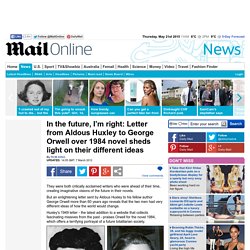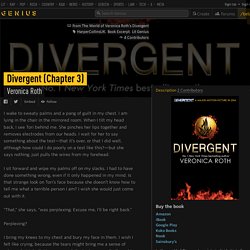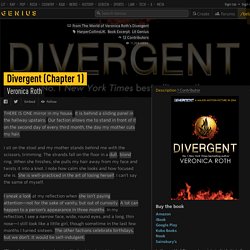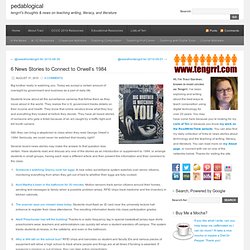

1984 utopia and dystopia. Aldous Huxley letter to George Orwell over 1984 sheds light on their different ideas. By Rob King Updated: 14:05 GMT, 7 March 2012 They were both critically acclaimed writers who were ahead of their time, creating imaginative visions of the future in their novels.

But an enlightening letter sent by Aldous Huxley to his fellow author George Orwell more than 60 years ago reveals that the two men had very different ideas of how the world would change. Huxley's 1949 letter - the latest addition to a website that collects fascinating missives from the past - praises Orwell for the novel 1984, which offers a terrifying portrayal of a future totalitarian society. Worlds apart: The novel 1984 by George Orwell, left, predicted a different world to that envisaged by Aldous Huxley, right But the late California-based author - who had coincidentally taught Orwell more than three decades earlier - went on to focus on the differences between Orwell's vision and that revealed in his own masterpiece. - Aldous Huxley Different visions?
1984 George Orwell Movie Trailer (1984) Divergent Scene : Tris's First Aptitude Test. 1984 Before and today. Veronica Roth – Divergent (Chapter 3) I wake to sweaty palms and a pang of guilt in my chest.

I am lying in the chair in the mirrored room. When I tilt my head back, I see Tori behind me. She pinches her lips together and removes electrodes from our heads. I wait for her to say something about the test—that it’s over, or that I did well, although how could I do poorly on a test like this? —but she says nothing, just pulls the wires from my forehead. I sit forward and wipe my palms off on my slacks. “That,” she says, “was perplexing. Perplexing? I bring my knees to my chest and bury my face in them. As the moments pass, I get more nervous. My mother told me once that we can’t survive alone, but even if we could, we wouldn’t want to.
Veronica Roth – Divergent (Chapter 2) The tests begin after lunch.

We sit at the long tables in the cafeteria, and the test administrators call ten names at a time, one for each testing room. I sit next to Caleb and across from our neighbor Susan. Susan’s father travels throughout the city for his job, so he has a car and drives her to and from school every day. He offered to drive us, too, but as Caleb says, we prefer to leave later and would not want to inconvenience him.
Of course not. The test administrators are mostly Abnegation volunteers, although there is an Erudite in one of the testing rooms and a Dauntless in another to test those of us from Abnegation, because the rules state that we can’t be tested by someone from our own faction. My gaze drifts from Susan to the Dauntless tables across the room. A group of Amity girls in yellow and red sit in a circle on the cafeteria floor, playing some kind of hand-slapping game involving a rhyming song. At the Abnegation table, we sit quietly and wait.
Veronica Roth – Divergent (Chapter 1) THERE IS ONE mirror in my house.

It is behind a sliding panel in the hallway upstairs. Our faction allows me to stand in front of it on the second day of every third month, the day my mother cuts my hair. I sit on the stool and my mother stands behind me with the scissors, trimming. The strands fall on the floor in a dull, blond ring. When she finishes, she pulls my hair away from my face and twists it into a knot. I sneak a look at my reflection when she isn’t paying attention—not for the sake of vanity, but out of curiosity. “There,” she says when she pins the knot in place. 1984 Chapitre 1. Français. Chapter One. English. 1984. 6 News Stories to Connect to Orwell’s 1984. Big brother really is watching you.

Today we accept a certain amount of oversight by government and business as a part of daily life. Students know about all the surveillance cameras that follow them as they move about in the world. They realize the U.S. government tracks details on their income and health. They know that online vendors know what they buy and everything they looked at before they decide. They have all heard stories of someone who gets a ticket because of an act caught by a traffic light and toll booth camera.
Still, they can bring a skepticism to class when they read George Orwell’s 1984. Several recent news stories may make the answer to that question less certain. Someone’s watching Granny cook her eggs. Student discussion of the articles can be guided with these questions: What freedoms or privacy rights does the system affect? If students read and discuss several of the articles, additional questions can ask them to compare and synthesize the pieces: